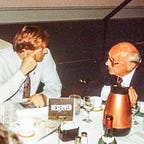The Ethics & Economics of Little Lord Fauntleroy
It’s one of those old films I heard about but never saw until today. The 1934 version of Little Lord Fauntleroy didn’t immediately strike me as having appeal — especially in this day and age.
But I was terribly wrong. It has a critical message — especially for this day and age. To explain why the film is made for our era I will have to explain the plot, so please forgive the spoilers, but if you see it later I believe you will still enjoy it.
We start on the streets of Brooklyn where Cedric “Ceddie” Errol Jr. lives with his mother. His British father died when he was young but was shunned by his family for marrying an American. Ceddie calls his mother “Dearest” because that is how he remembers his father speaking to her.
Ceddie’s friends are Dick a shoeshine boy; Silas Hobbs, the grocer; and Mrs. McGinty, an elderly woman who sells apples to survive.
We quickly see certain traits in Ceddie. He’s considerate of others and genuinely concerned about their well being. If there is one dominant trait in the boy it’s his respect for everyone he meets.
One day Ceddie returns home to find Dearest speaking to Mr. Havisham an attorney from England. We learn Ceddie’s deceased father was the son of the Earl of Dorincourt and this made the boy Lord Fauntleroy.
As Havisham is speaking a neighbor woman, desperate for financial assistance, asks to speak to Dearest. When she returns Dearest tells Ceddie and Havisham what it was about and the boy immediately blurts out he wished he could help her. Havisham asks him if he really means it and Ceddie says yes.
The attorney hands him money saying his grandfather instructed him to give Ceddie money for anything he wants. The excited boy runs from the room and gives the money to the woman. He returns moved because the woman cried with joy because of it.
Havisham asks Ceddie what else he would like. He speaks of how he’d like to buy a proper stall for Mrs. McGinty to sell her apples, along with a nice shawl to keep her warm; he wants a shoeshine stand for Dick and a nice watch for Mr. Hobbs.
Havisham is surprised the boy’s first thoughts were his friends. He presses Ceddie if there is anything he would want for himself and he admits he’d like a pony.
The family goes to England and Ceddie assumes his grandfather — a caustic, curmudgeonly man — is kind and generous based on Havisham’s helping him buy the presents for his friends. The Earl is shocked by the boy’s respect for him and is surprised by the boy’s kind thoughts about him. He starts to feel compelled to live up to Ceddie’s expectations.
In addition to his respect for others we find the boy generously kind to those he meets. Those two traits win him the love and affection of his grandfather, and everyone else he meets.
The world in which Ceddie lives changes because of him; he helps create the kind of world in which he wishes to live.
People would call Ceddie “selfless” but I contend they have it wrong. His kindness and respect creates the world in which he wants to live — that is ultimately in his self-interest. The truly selfless are cruel because their cruelty creates animosity against them. Creating enemies is contrary to one’s rational self-interest.
Respecting the rights of others is the only way to safeguard your own rights. That’s the basic principle of what was known as classical liberalism. Similarly a kind world is one that benefits you as well as others.
When we understand fundamental economics we understand markets create voluntary webs of social cooperation and what benefits some benefits all. We all prosper when others do. Just as your rights require the rights of others be secure, your economic well-being depends on the economic well-being of others.
Imagine trying to open a shop; for you to prosper there have to be enough customers ready, willing and able to purchase your goods. You can’t sell to people who have no money. Your financial security depends on their financial security. Your “selfish” wants are only satisfied if others are sufficiently well off to spend money with you.
Remember in depoliticized markets others can reject your goods or services so you have to treat them right in order to be treated well yourself.
Our age has become one of anger and hate. Certain political types have actively promoted hatred and disdain for the rights and well-being of others. That doesn’t lead to prosperity but to poverty and misery. Hate and anger are not in our own self-interest — it momentarily benefits the politicians who use it — but it makes the rest of us poorer and diminishes the rights we enjoy.
SUPPORT THIS PAGE AT PATREON
Your support to fund these columns is important, visit our page at Patreon.
Follow our daily comments at Twitter. If you are looking for discounted libertarian books visit our Freeminds website. If you wish to subscribe, free of charge, to this page you can have all new essays emailed to you. Just sign up here.
